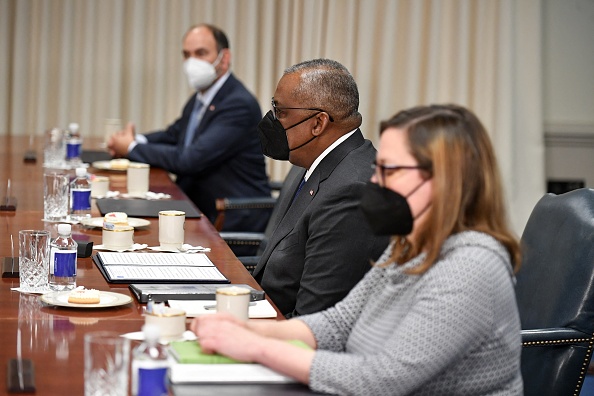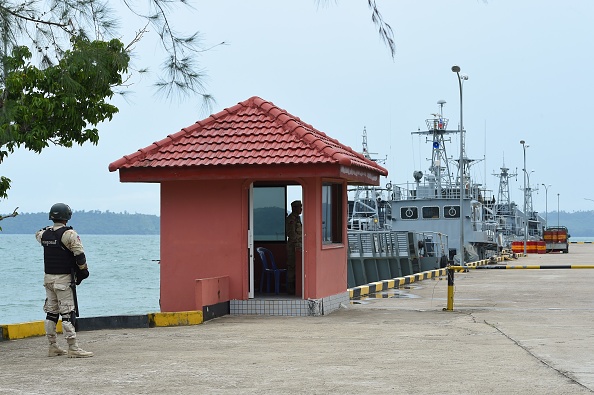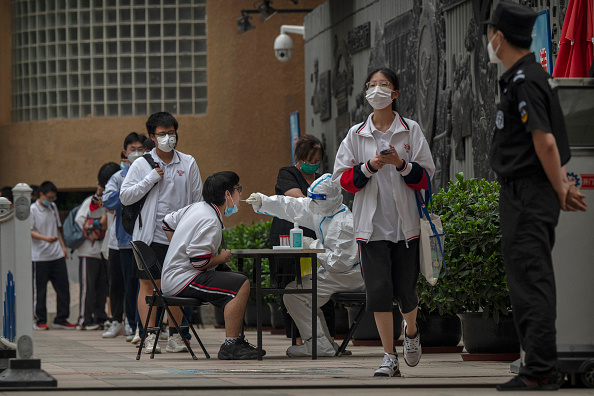
 Squaring Off
Squaring OffThe Chiefs of Defense from China and the U.S. squared off this week over the issue of Taiwan on the sidelines of the Shangri-La Dialogue in Singapore. In advance of the meeting, the U.S. said the discussion would be "about setting guardrails on the relationship."
During their first in-person meeting, Defense Secretary Lloyd Austin met with his Chinese counterpart, Minister of National Defense General Wei Fenghe, for an hour where the U.S. urged Beijing to refrain from destabilizing actions, while China said the PLA would 'fight at all costs' to defend Chinese sovereignty.
Austin reiterated the U.S. commitment to its One China policy and warned that the Chinese military has become increasingly aggressive, unsafe, and unprofessional in the region. The comments reflect U.S. concerns that Beijing may be altering the status quo regarding Taiwan, a democratically controlled island that China claims as its sovereign territory.
China reiterated its stance on Taiwan, citing they would resort to military action if necessary.
Despite some bluster, Beijing described the meeting as "constructive" and both sides agreed to maintain lines of dialogue in the future.
Read more in "War is Too Terrible to Contemplate: America and China Must Confront Risk of Conflict," by Doug Bandow, a Senior Fellow at the Cato Institute.
 Ironclad Brothers
Ironclad BrothersAt a ceremony this week, Cambodian and Chinese officials broke ground on a naval base on the northern portion of Cambodia's Ream Naval Base on the Gulf of Thailand. Holding spades decorated with red bows, they turned over soil to signal the expansion and upgrade of a Chinese-funded construction project that has raised alarm bells in the U.S. The naval base will give Beijing increased access to the contested South China Sea, and mark a major expansion of its military and economic clout in the Indo-Pacific.
"China and Cambodia have become ironclad brothers," said China's ambassador to Cambodia, Wang Wentian, at the ceremony.
The base has been the subject of rumors for years, all of which have been strongly denied by both the Chinese and the Cambodians. The U.S. has repeatedly expressed concern, and accused Cambodia of lacking transparency. This week, Cambodia continued to deny that China would have exclusive access to the port. The project "doesn't serve any interests which are a threat to neighboring countries or in the region," said Gen. Chau, director-general of the Cambodian Defense Ministry's material and technical-services department.
Currently, China's only other foreign military base is a naval facility in Djibouti. The new base in Cambodia will be able to host large naval vessels and will allow China to expand its influence in the region and strengthen its presence near key Southeast Asian sea lanes.
In a press briefing on Tuesday, Chinese Ministry of Foreign Affairs spokesperson Zhao Lijian called U.S. concerns over the port "a typical bullying act" from the United States. "The U.S. has turned a deaf ear to Cambodia's position, repeatedly making malicious speculations, attacking and smearing Cambodia, and even threatening and pressuring Cambodia," Zhao said.
 Facing the Future
Facing the FutureA record 11.93 million Chinese students are taking the national college entrance exam this year as China continues to battle widespread Covid-19 outbreaks. The notoriously tough test, known as the "gaokao," began on Tuesday in most cities and will be the largest mass gathering ahead of the Chinese Communist Party congress in the fall, pressuring China's already strained pandemic-prevention system.
After a grueling, locked-down spring in many Chinese cities, local officials are working hard to ensure the test doesn't become a super-spreader event. Temperature checks, masks and negative P.C.R. test results were the basic prerequisites for students to take the exam. Some test takers were discouraged from leaving their homes for two weeks before the exam, while others had to travel to testing sites in specially arranged vehicles from their homes in locked-down areas. Even more, a few schools had their teachers and students collectively lockdown weeks before the exam.
In China, the gaokao is widely considered the country's most important exam for high school students hoping to pursue undergraduate education, and can "make or break a young person's future." And the students taking this year's gaokao have endured three years of repeatedly disrupted high school study due to pandemic lockdowns and stents of remote learning, leading parents to fear that their children won't measure up to students from cities who didn't experience as many lockdowns.
"This class is especially unfortunate," a father from Shenzhen said. "They've been taking online classes for three years. If they have to compete with students across the country, they will be at a disadvantage."
Despite the challenges, teachers and parents showed up to cheer for their students as they headed into exam sites and faced the test that will help determine their future.
Prepared by China-US Focus editorial teams in Hong Kong and New York, this weekly newsletter offers you snap shots of latest trends and developments emerging from China every week, while adding a dose of historical perspective.
- 2022-06-03 Diplomatic Chills
- 2022-05-27 Competing Visions
- 2022-05-20 Common Ground
- 2022-05-13 Bilateral Interests
- 2022-05-06 Vying for Mutual Benefit
- 2022-04-29 Seeking Relief
- 2022-04-22 Tipping Point
- 2022-04-15 “Persistence is Victory”
- 2022-04-08 No Divorce
- 2022-04-01 Auditing Accountability
- 2022-03-25 Playing Policy
- 2022-03-18 One Hand Cannot Clap
- 2022-03-11 Political Forecast
- 2022-03-04 Competitive Advantage
- 2022-02-25 A Sovereign Tightrope
- 2022-02-18 Strategic Disengagement
- 2022-02-11 In the Thick of It
- 2022-02-04 Year of the Tiger
- 2022-01-28 Zero-Sum
- 2022-01-21 An Uncertain Future
